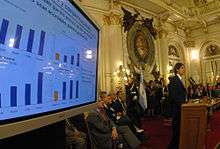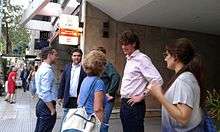Martín Lousteau
| Martín Lousteau | |
|---|---|
 | |
| Argentine Ambassador to the United States | |
|
In office 10 December 2015 – 3 April 2017 | |
| Preceded by | Cecilia Nahón |
| Succeeded by | Fernando Oris de Roa |
| National Deputy for the City of Buenos Aires | |
|
Assumed office 10 December 2017 | |
|
In office 10 December 2013 – 10 December 2015 | |
| Minister of Economy | |
|
In office 10 December 2007 – 24 April 2008 | |
| President | Cristina Fernández de Kirchner |
| Preceded by | Miguel Peirano |
| Succeeded by | Carlos Fernández |
| President of the Bank of the Province of Buenos Aires | |
|
In office 28 December 2005 – 10 December 2007 | |
| Preceded by | Adolfo Boverini |
| Succeeded by | Guillermo Francos |
| Personal details | |
| Born |
December 8, 1970 Buenos Aires, Argentina |
| Political party | Radical Civic Union (since 2017) |
| Other political affiliations | Broad Front UNEN (2013–15) |
| Spouse(s) | Carla Peterson |
| Alma mater |
University of San Andrés London School of Economics |
Martín Lousteau (Occitan pronunciation: [lɔwsˈtaw]; born December 8, 1970) was the Minister of Economy and Production of Argentina under the administration of President Cristina Fernández de Kirchner, from December 10, 2007, until April 24, 2008. At the age of 37, Lousteau was the youngest person to occupy this office in more than five decades.[1]
Lousteau briefly served as the Argentine Ambassador to the United States from 2015 to 2017.[2] Since 2017, he has been a National Deputy, representing Buenos Aires City.
Biography
Early career
Lousteau was born in Buenos Aires. He graduated from Colegio Nacional de Buenos Aires. He is a Licentiate in Economics (graduated summa cum laude from the Universidad de San Andrés), and a Master of Science in Economics (at the London School of Economics). He taught as a postgraduate professor at the Universidad Torcuato Di Tella, and as graduate professor at the Universidad de San Andrés.[3]
He is the author of Sin Atajos (No Shortcuts, 2005), a history of Argentina's economic crises, with Javier González Fraga;[4] and Hacia un Federalismo Solidario (Towards a Cooperative Federalism), as well as specialized works and journalistic articles that have been published in Argentina and abroad. Lousteau had also been a tennis instructor (which he quit because of an injury), and worked as a war correspondent in Afghanistan for the magazines El Planeta Urbano and La Razón before the September 11, 2001 attacks.[5]
Lousteau served as chief economist and later director of APL Economía, a consulting firm founded by former Central Bank President Alfonso Prat-Gay, and went on to hold various public offices as well as positions in the private sector. He was appointed Adviser to the President of the Central Bank of Argentina in 2003, for whom he designed a bank matching scheme for the payment of the discount window loans; and served in the Central Bank's Committee on Monetary Policy until 2004). He was appointed by Governor Felipe Solá as Minister of Production of Buenos Aires Province in 2005, and late that year was named Chairman of the Bank of the Province of Buenos Aires and of its parent company, the BAPRO Group, where he served from 2005 until his designation as Economy Minister in December 2007. He later co-founded a business consulting firm, LCG, with Gastón Rossi.[3]
Minister of Economy

Lousteau was the first minister of economy of Cristina Fernández de Kirchner. There was a dispute in the cabinet at the time between Julio de Vido, Ricardo Jaime and Guillermo Moreno, and Alberto Fernández, Graciela Ocaña, Jorge Taiana and Carlos Tomada. Lousteau sided with Alberto Fernández, as he did not share the economic views of De Vido and Moreno. Fernández had promised him that both of them would be removed from government in a short time.[6] Lousteau wrote a report for the president on the figures of the national economy, praising several aspects of the tenure of Néstor Kirchner, but warning about the growing inflation. This report was dismissed by Néstor Kirchner, who did not have an actual office but remained an influential figure. He also proposed to gradually reduce the subsidies to energy consumption, to eventually abandon the fixed price system established during the 2001 crisis. Cristina Kirchner did not support his proposal.[7]
The salient feature of his tenure was the controversy surrounding his decision to increase soybean export taxes, which were previously fixed at 35%, and to have them fluctuate in line with global prices for the crop.[8] This has been claimed as the major cause of the protests in the Argentine countryside which took place in early 2008.[9] Lousteau was heavily involved in talks with farmers' leaders but was later sidelined.[10]
Lousteau was rumored as early as two months into his tenure to have declared his intention to resign as a result of disputes with fellow ministers, particularly Commerce Secretary Guillermo Moreno.[11] He denied he would resign; but there was nevertheless continued speculation on his resignation or replacement in the wake of the agrarian crisis.[12] Lousteau resigned on April 24, 2008, with the tax agency chief Carlos Fernández replacing him.[13]
According to the Wall Street Journal, his brief tenure was clouded from the outset by interference from former President Néstor Kirchner's allies. Lousteau's policy initiatives often seemed to be eclipsed by those of Commerce Secretary Guillermo Moreno, a Kirchner loyalist described as "the administration's price policeman."[14]
Later work

Following his dismissal Lousteau contributed a weekly opinion column for the conservative daily La Nación and published two best-selling books on economic theory and history, Economía 3-D (2011) and Otra vuelta a la economía (2012). He received a Yale World Fellowship in 2012.[15] Lousteau married television actress Carla Peterson in New Haven, Connecticut, in September 2012, and the couple had a son, Gaspar, the following January.[16]
Lousteau joined the UNEN coalition, led by the centrist UCR, and was nominated to their City of Buenos Aires party list for Congress in the 2013 mid-term elections.[17] He was one of five UNEN candidates elected to Congress for the City of Buenos Aires; but ongoing differences with caucus leader Elisa Carrió led Lousteau to form his own faction (Suma + UNEN), joined by UNEN Congressmen relying in grasroots action in the UCR.[18][19] He ran for mayor in 2015 backed by centre-left coalition called ECO (Energía Ciudadana Organizada; "Organized Citizen Energy"), and was narrowly defeated by Horacio Rodríguez Larreta.[20] He was appointed ambassador of Argentina to the United States by president Mauricio Macri in 2016.[21]
Written books
- Hacia un federalismo solidario (2003)
- Sin atajos (2005)
- Economía 3D: una nueva dimension para tus preguntas de siempre (2011)
- Otra vuelta a la economía (2012)
References
- ↑ "¿Quién es Martín Lousteau, el nuevo ministro de Economía?". Minuto Uno. November 14, 2007.
- ↑ "Martín Lousteau renunció a la embajada en EE.UU.:"Quiero ser candidato en la Ciudad"". Clarín (in Spanish). 4 April 2017. Retrieved 12 August 2018.
- 1 2 "About Us". LCG S.A.
- ↑ Javier González Fraga; Martín Lousteau (2005). Sin atajos: de la ciclotimia a la madurez del desarrollo. Temas Grupo Editorial. ISBN 978-950-9445-12-3.
- ↑ "Martín Lousteau". Retrieved 5 July 2015.
- ↑ Lanata, p. 13
- ↑ Lanata, p. 15
- ↑ Argentina's Economy Minister Is Under Fire Over Soybean Tax. Wall Street Journal, April 7, 2008
- ↑ "Cristina's Argentine Honeymoon Ends". TIME.com. 2 April 2008. Retrieved 5 July 2015.
- ↑ "Lousteau, fuera de la negociación". Retrieved 5 July 2015.
- ↑ "Lousteau: "No voy a renunciar"". Retrieved 5 July 2015.
- ↑ "Lousteau cultiva bajo perfil, pero cosecha rumores de recambio". Retrieved 5 July 2015.
- ↑ "BBC NEWS - Business - Argentina's economy chief quits". BBC News. April 25, 2008. Retrieved 5 July 2015.
- ↑ New Argentine Economy Chief to Stay Course. Wall Street Journal, April 26, 2008
- ↑ "Martín Lousteau". Yale World Fellows.
- ↑ "Casamiento expres: boda secreta de Carla Peterson y Martín Lousteau". Diario Popular. October 1, 2012.
- ↑ "Martín Lousteau fue presentado oficialmente por Rofolfo Terragno como candidato a diputado". La Nación. June 11, 2013.
- ↑ "Carrió y Lousteau se desUNEN en bloques en Diputados". Perfil. December 3, 2013.
- ↑ "Bloques". Honorable Cámara de Diputados de la Nación. Archived from the original on 2014-03-24.
- ↑ "Horacio Rodríguez Larreta ganó el ballottage por una ajustada diferencia" [Horacio Rodríguez Larreta won the ballotage by a short difference] (in Spanish). La Nación. July 19, 2015. Retrieved November 14, 2016.
- ↑ "Ya es oficial la designación de Martín Lousteau como embajador en Estados Unidos" [The designation of Martín Lousteau as ambassador to the United States is now official] (in Spanish). La Nación. January 18, 2016. Retrieved November 14, 2016.
Bibliography
- Lanata, Jorge (2014). 10K. Argentina: Planeta. ISBN 978-950-49-3903-0.
| Diplomatic posts | ||
|---|---|---|
| Preceded by Cecilia Nahón |
Argentine Ambassador to the United States 2015–2017 |
Succeeded by Fernando Oris de Roa |
| Political offices | ||
| Preceded by Miguel Peirano |
Minister of Economy 2007–2008 |
Succeeded by Carlos Fernández |
